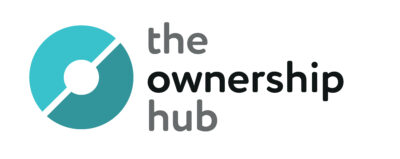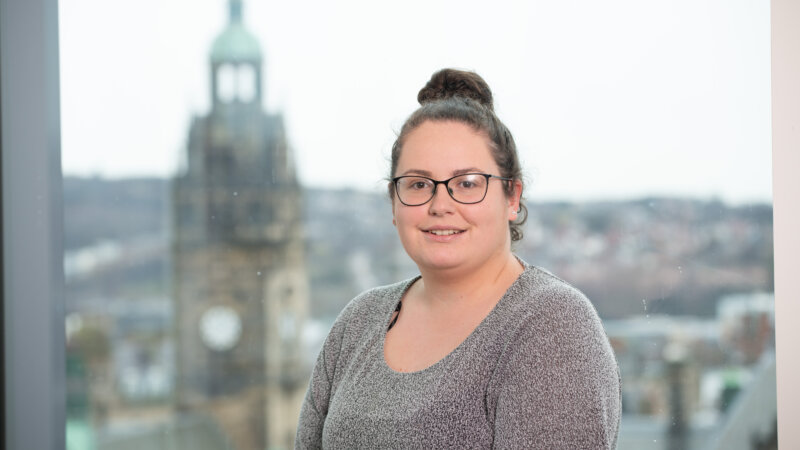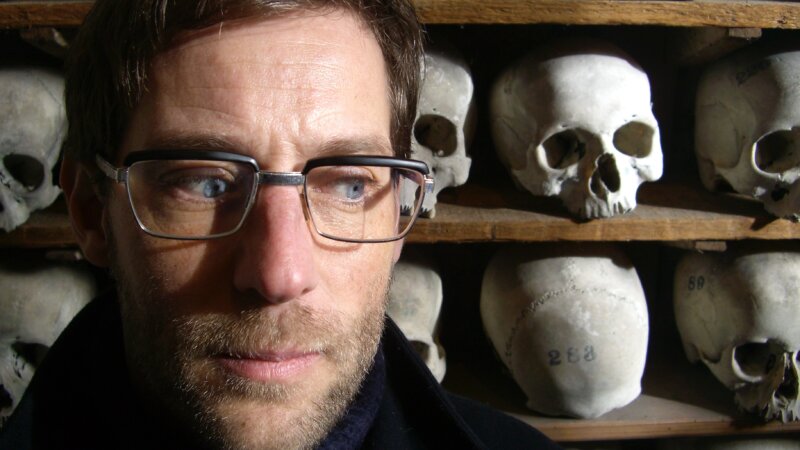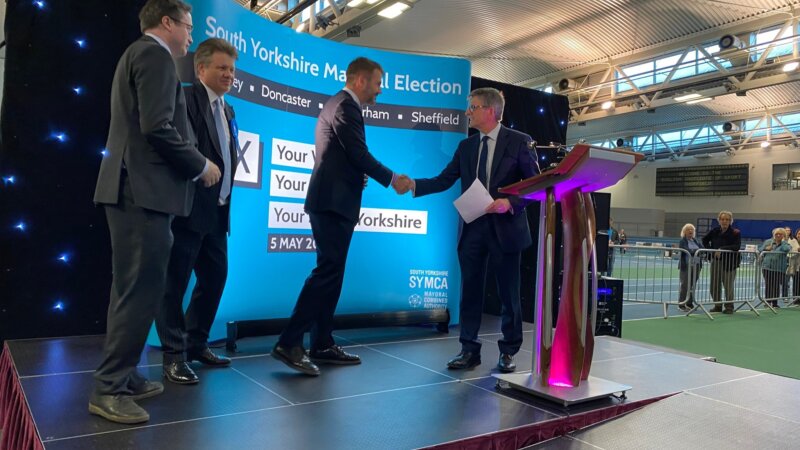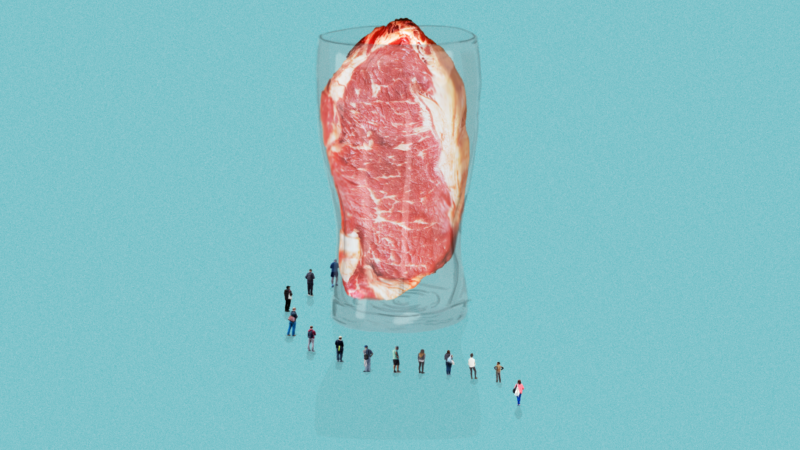Agency in the Workplace: Big Smile Tattoo
Rae, Josh and Jakob explain how they are challenging hierarchies and abuses of power in the tattoo industry through their egalitarian co-operative structure – and what that means for them as individuals.
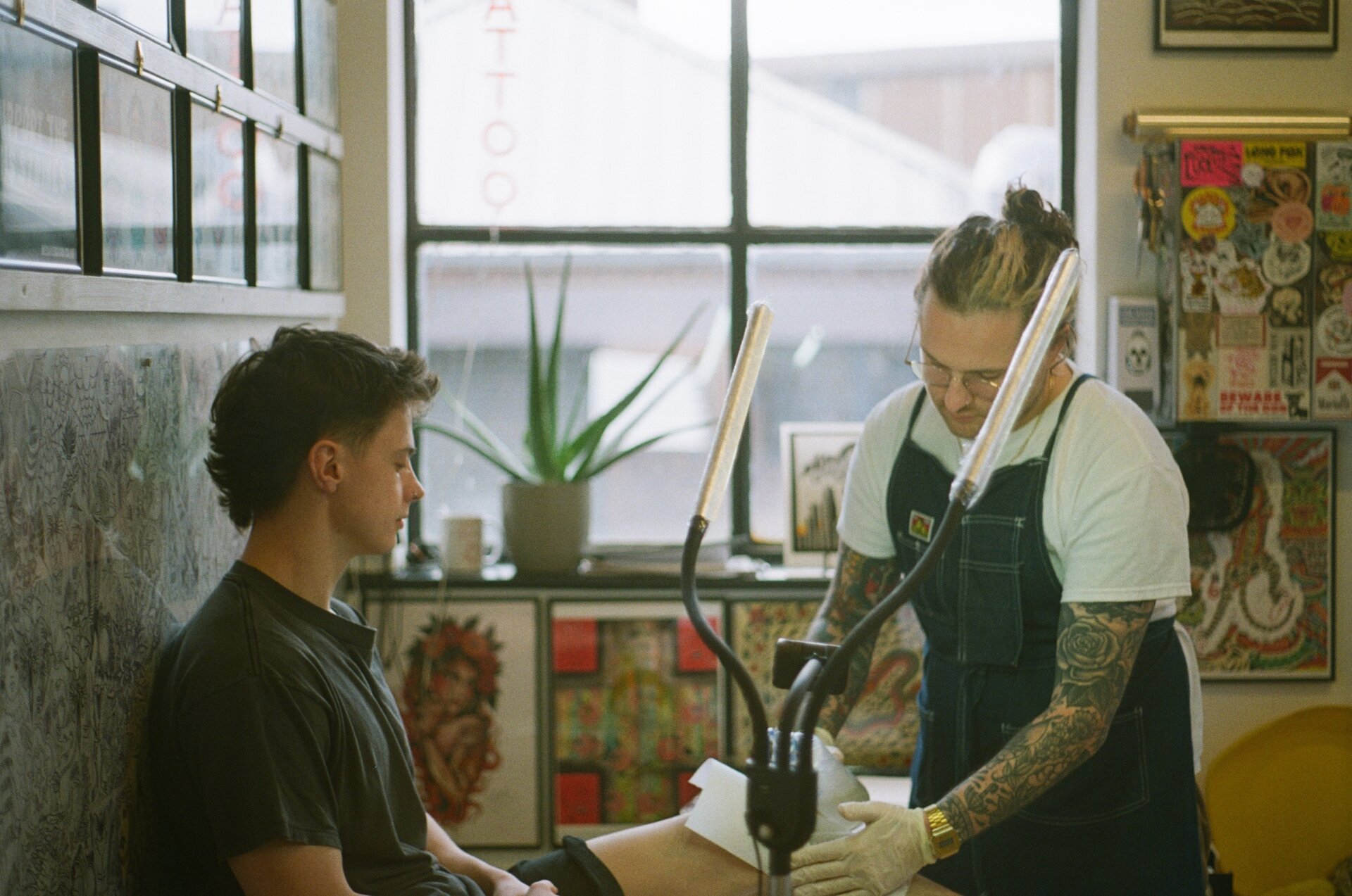
Jakob with a customer at Big Smile's studio.
Big Smile TattooThis piece is part of our generative inquiry entitled Agency in the Workplace, exploring worker ownership and worker control of organisations in South Yorkshire through the stories of local people.
Big Smile Tattoo is a tattoo studio located in Kelham Island, specialising in traditional and botanical tattoos. Founded almost a year ago by artists Rae, Jakob and Josh, who between them have more than 20 years of experience, Big Smile wants to use its cooperative structure and egalitarian ways of working to challenge hierarchies and abuses of power in the industry, as well as providing a safe, welcoming space for its clients.
The three artists told us more about their intentions with setting up the co-op and their personal experiences of ownership and control at work.
Thanks Josh, Rae and Jakob for making the time to talk to me today. So, straight in at the deep end. How has having ownership/control in your workplace changed your life?
Josh: My anxieties have kind of changed from things that are unknown – whether the boss is going to be in a good mood, or whether they're going to shut the shop, or hire more artists – it's shifted to things that are known. Still stresses, but it's changed [to] things that can be tackled with organisation, communication, as opposed to just walking blind, hoping that things don't come out of left field and ruin the day.
Jakob: I'd say that having collective ownership has just massively changed me as a person and my mental health. Partly due to the fact that I've always had a problem with authority [...] I was just earning somebody else money and I didn't have anything that I could impact. Collective ownership has made my life better. I feel like I'm working towards something, rather than working against something.
Rae: I think I’d just add that having equal ownership has generally made it a bit more relaxed. We are in control. We don't have to feel guilty for taking time off or anything like that.
Why is having ownership of your working practice, and the associated control, important to each of you in particular, would you say?
Josh: There's a lot of hierarchies, power structures, abuse of power in the world. And the tattoo industry, I think, it’s a really unregulated space. It allows for negative attitudes, or mental abuse, or physical abuse, or even sexual abuse in some cases to nip under the radar. We wanted everyone in one room, one space with no physical separation. It gives no space for those things to really happen.
We're all kind of each other's boss in a way, more than just colleagues and friends. It really creates this dynamic where we're all responsible for each other. In some studios we’ve worked, there's an ‘open door policy’ with the boss, but it's always on their terms. It's always for their benefit. As long as what you want aligns with their long-term goals, usually financial, then that's fine. But if you've got an issue that is something that would undermine that position that they have or, God forbid, take away some of their income stream, it really shines a light on the power structures there. I think if we can remove as many of those as possible, you end up with a much fairer place for people to work.
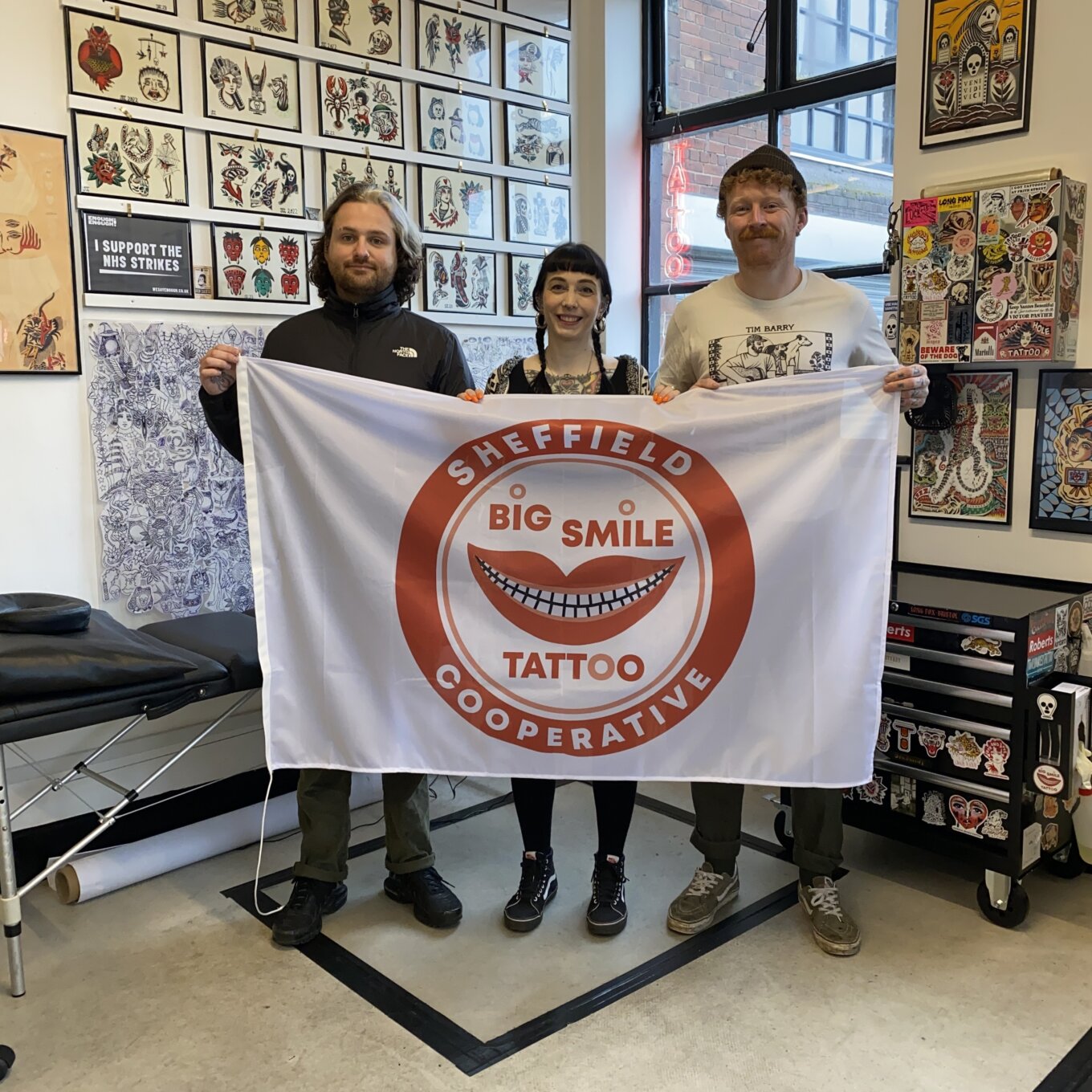
The Big Smile team: Jakob, Rae and Josh.
Big Smile TattooIt's interesting that you mentioned ‘shining a light’, as the first thing that struck me was just how open and well lit your studio space is.
Jakob: Yeah, that was really important for us, to have a big open space where everyone is on the same level, both physically and mentally.
To follow on from what Josh was saying, this isn't every shop owner in the industry, but a lot of them I've come across, it seems that they start out with the best intentions, but then as soon as they realise they have a very solid revenue stream coming in, then everything becomes about money. It's a very difficult space to work in, that.
Josh: I don't find many people having large, thoughtful
discussions in the industry. I think a lot of people see ownership of a
space and having a passive income from four or five guys working [...]
as some sort of security for later in life, when you maybe can't tattoo
until you're 60. But I mean, you can probably earn enough money to put
into savings and early retirement funds to bolster that. When I hear
people complaining that they don't want a co-op because, ‘What am I going to do later in life? I need to get mine,’ it's like, you've had the opportunity to earn good money for 25 years. You not put any of it aside to account for early retirement?
You mentioned that if everywhere was a co-op, or held the kind of values that are inherently present in one, you feel that it’d be a positive shift in how the industry operated. If worker controlled organisations did become the norm, in what ways do you think communities in South Yorkshire might change?
Josh: I feel that in doing this project with these two fantastic people, it's kind of forced us all to progress personally in communication and confidence. I think if more people are involved in things like this there would be a lot more contented, happy people. I'm not sure how that relates to the wider community, but I think more happy people can't be a bad thing.
Rae & Jakob: Yeah, absolutely. 100%.
Jakob: I felt like at previous shops that [...] just because of the dynamics of the shop, it made me feel like everybody out there that's tattooing that's not in this shop is your competition. Matter of fact, that's not the case at all. They’re actually your friends more than anything. Everyone benefits from open communication and talking about ideas, rather than just getting your head down and focusing on just what you’re doing.
It feels like there's been a sense of proprietary
and duty of care, and responsibility that I'm picking up on. So on that
point, what commitments do you hold that are important for you to honour
in your work?
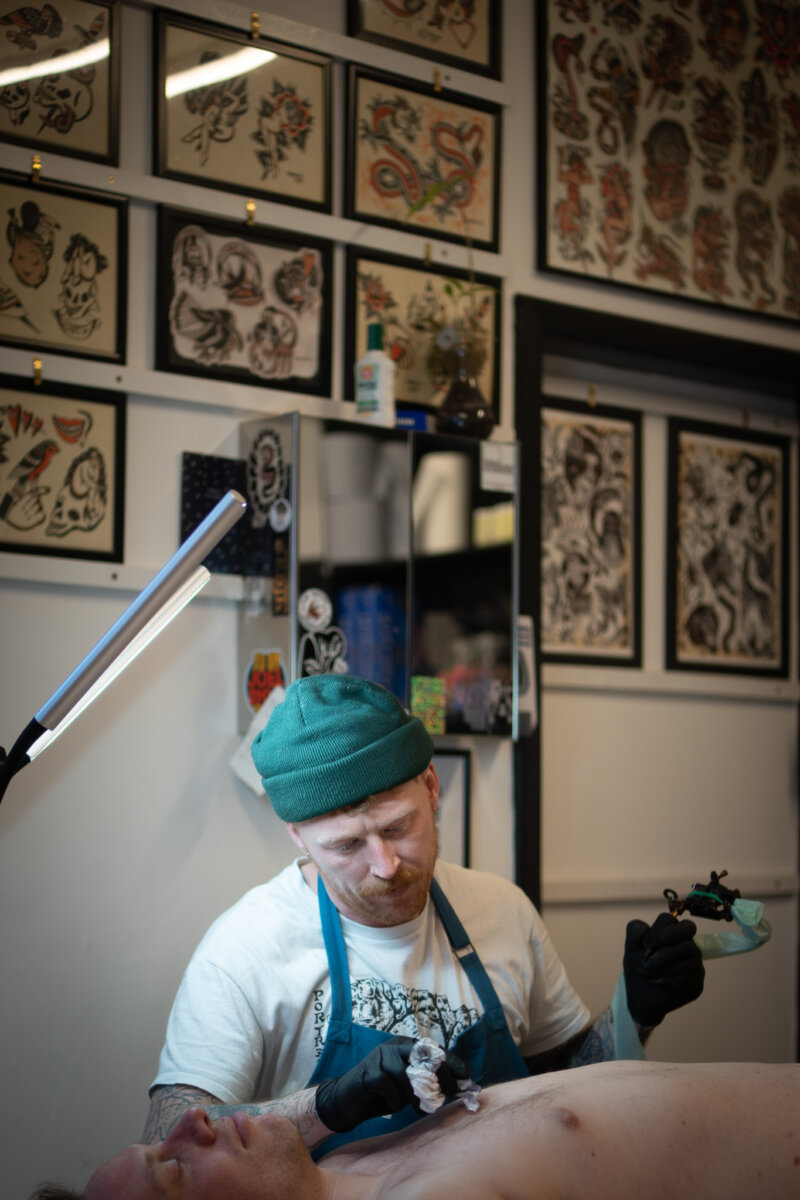
Rae: We want people to know that they will be safe when they come in, and have a good experience. Because there's so many stories on Instagram of certain artists abusing the power and not giving their clients good experiences. So that was very important to us.
Josh: I work for four and a half days a week, and that's great, and I really enjoy it. But what I really hope is that if someone was dangling a big financial carrot in front of me, I could stick to the ideals and go, no, co-operative [working] is the way forward and is best for everyone.
Jakob: The older generation of tattooers don't want [co-ops] because you're taking their income away from them. But the internet came along and all the information is out there.
You don't see until you're on the outside, the manipulation that you're under to believe this is the only way of doing things.
Rae: And you almost feel guilted into that way of doing things, too. Like, ‘I taught you how to tattoo, so now your hands are mine!’
Jakob: That’s the classic phrase, ‘I own your hands’.
Seriously?
All: Yep!
What is the best thing that could happen and, by extension, what would you like to see happen next?
Jakob: I'd love to wake up tomorrow and loads of tattoo co-ops had opened. That would be amazing.
I would like to see that then lead to some more regulation in the tattoo industry, but only led by tattooers. We don't want someone who has no idea about tattooing to come in and start regulating it because that's just a recipe for disaster.
Josh: But that's not going to come from shop owners. Self-governance is going to come from workers. Shop owners want to keep everything like it is. They don't want any change.
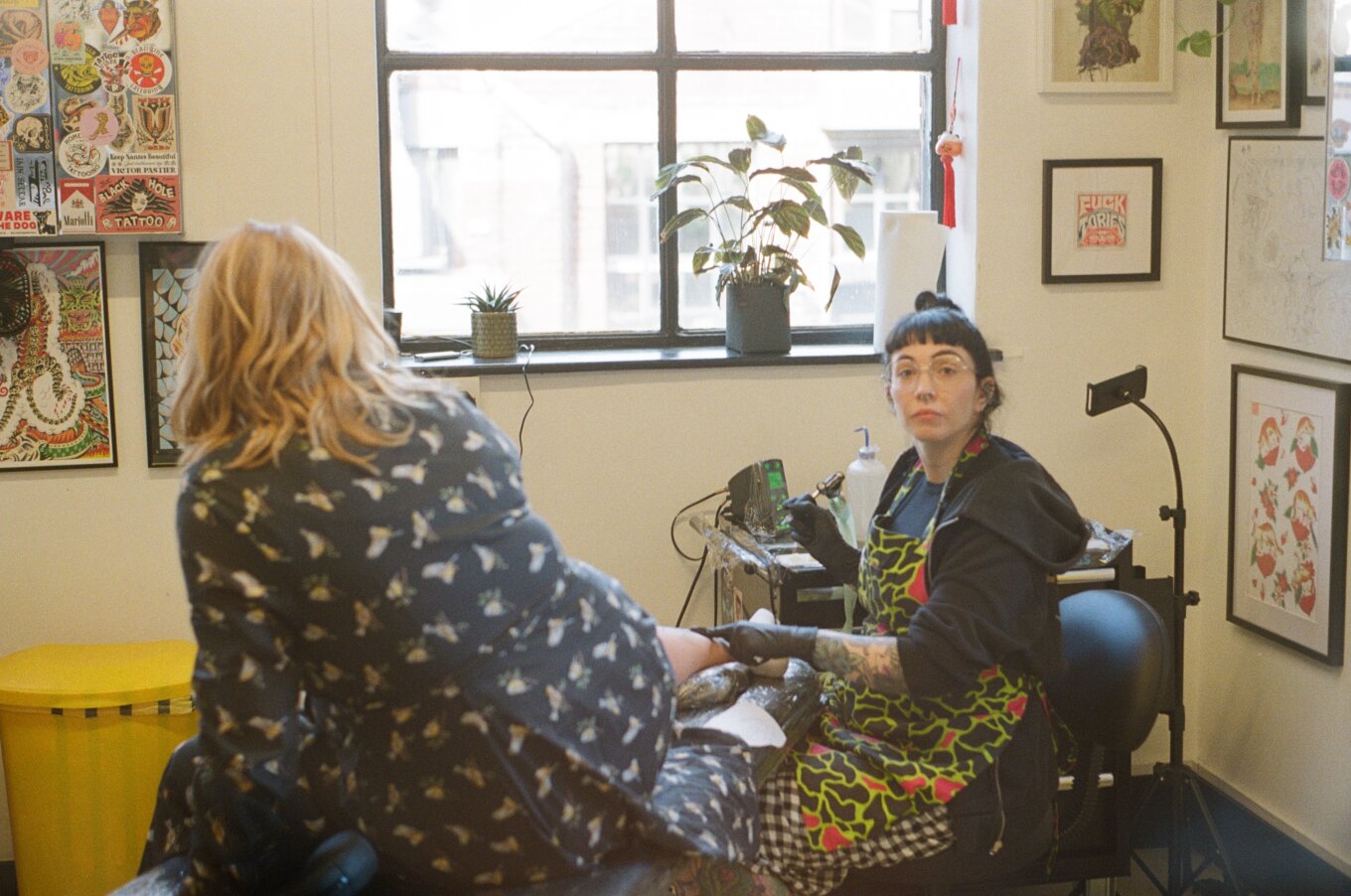
I’d also like to see more tattooers that are more humble. Because I do know a lot who are humble, and are appreciative of the fact that they get to do this thing they love. But I also see a lot of people that have this kind of rockstar attitude.
Finally, is there anything throughout this process that's come to light for you, or that you felt like you wanted to expand upon in any way?
Josh: The process of preparing for [this interview] has made me think I want to explore these ideas more and write something down [...] send it out to a few places and maybe get a few people talking.
Jakob: We're doing this because we love tattooing and we think this is what's best for tattooing, the tattoo community across the world even. That set-up so there's shared ownership really takes a lot of the stresses away and allows you to focus on doing good tattoo work and just loving the process.
Rae: We're just passionate about the whole idea of it as well. It's not just what was good for us personally, but like Jakob was saying it’s about the whole industry, and how something like this would benefit people across the board.
Jakob: If anybody has any questions regarding shared ownership, particularly in terms of a creative space, we're more than happy to answer any questions or direct you to the right information about how to do it.


